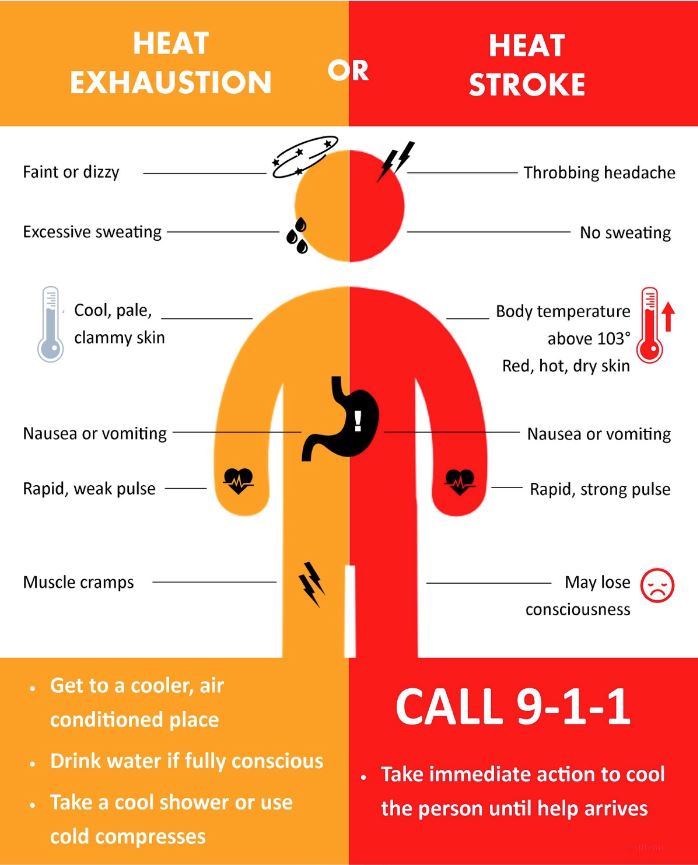Houston summers are often filled with days of extreme heat and high humidity. These conditions slow evaporation and force the body to work extra hard to maintain a normal temperature, making heat a danger. Most heat disorders occur because a person has been overexposed to heat or has over-exercised for his or her age and physical condition. Older adults, young children and those with underlying health conditions are more likely to succumb to extreme heat.
The Heat Index is a measure of how hot it really feels when relative humidity is factored in with the actual air temperature. This is better explained as what the heat "feels like" rather than the actual temperature outside.
When the heat index rises above 108F for two days, the National Weather Service may issue a Heat Advisory.
The Office of Emergency Management (OEM) and the Houston Health Department (HHD) recommend residents stay safe during hot weather using the tips and resources below.
What Should I Do?
When extreme heat occurs, Houston residents should take steps to reduce their exposure. The Houston Health Department recommends that residents take the following steps to keep themselves cool:
- Increase water consumption. Drink lots of liquids even before getting thirsty, but avoid those with caffeine, alcohol or large amounts of sugar because these can actually result in the loss of body fluid.
- Conduct outdoor work or exercise in the early morning or evening when it is cooler.
- Outdoor workers should drink plenty of water or electrolyte-replacement beverages and take frequent breaks in the shade.
- Those unaccustomed to working or exercising in a hot environment need to start slowly and gradually increase heat exposure over several weeks.
- Use a buddy system when working outside and let your body acclimate to the heat before you try to exercise.
- Wear light-colored, loose fitting clothing that permits the evaporation of perspiration.
- Do not leave children, senior citizens or pets unattended in a vehicle.
- Look before you lock. Don't forget about sleeping children.
- Cars heat up quickly even if the windows are slightly open.
- A wide-brimmed hat helps prevent sunburn as well as heat-related illness. Sunscreen also protects from the sun’s harmful rays and reduces the risk of sunburn.
Stay Cool at Home
- Pay attention to the temp in your home.
- Use your stove and oven less to maintain a cooler temperature in your home.
- Install window air conditioners securely and insulate if necessary.
- Check air-conditioning ducts for proper insulation.
- Weather-strip doors and sills to keep cool air in.
- Cover windows that receive morning or afternoon sun with drapes, shades or awnings.
- Drink more water than usual even if you do not feel thirsty.
- Use cooling towels.
- Take cool baths or showers.
- Wear light-colored, loose fitting clothing.
Know the Signs and Take Action
Know the signs of heat exhaustion and heat stroke. Take action to avoid illness and loss of life:

| Condition | Symptoms | Response |
| Sunburn | Skin redness and pain, possible swelling, blisters, fever, headaches |
|
| Heat Cramps | Painful spasms, usually in leg and abdominal muscles; heavy sweating |
|
| Heat Exhaustion | Heavy sweating but skin may be cool, pale, or flushed. Weak pulse. Normal body temperature is possible, but temperature will likely rise. Fainting or dizziness, nausea, vomiting, exhaustion, and headaches are possible. |
|
| Heat Stroke | High body temperature (105+); hot, red, dry skin; rapid, weak pulse; and rapid shallow breathing. Victim will probably not sweat unless victim was sweating from recent strenuous activity. Possible unconsciousness. |
|
Protecting Pets
BARC Animal Shelter & Adoptions reminds pet owners of the following sings of heatstroke in their pets:
- Excessive or exaggerated panting
- Lethargy
- Weakness
- Drooling
- High fever
- Dark red gums
- Rapid heartbeat
- Unresponsiveness to commands and surroundings
- Vomiting
- Collapse
- Staring/anxious expression
- Warm/dry skin
If you think your pet may have heatstroke, head straight to your vet's office. It could save their life.
If you see an animal locked in a car on a hot day, find the owner as soon as possible. If you can't find the owner, call 911.
Stay Informed
For up-to-date weather information, visit the National Weather Service Houston/ Galveston forecast office website: weather.gov/houston.
AlertHouston offers alerts for residents, businesses, and city visitors in the event of an emergency. If the City of Houston declares an extreme heat event, you will receive a direct message via text, call, email, push app notification.
You can also follow the City of Houston OEM on Twitter (@houstonOEM) and Facebook (facebook.com/houstonoem).
